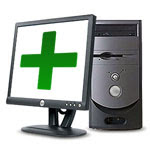
One of the most common questions I am asked is, “How can I speed up my PC?” It sounds like such a simple question. Unfortunately, there really is no simple answer that will speed up “everyone’s” PC. Everyone has different brands of computers, hardware configurations, software programs, user logins…etc., and there are many causes for slowdowns. Don’t stop reading now, though. I do have some general tips that should help speed up your PC.
10 Tips to Speed up Your PC (Windows XP).
1. Add More Memory - If you have Windows XP, you should have at least 1 GB of RAM. If you have Vista, you should have 2 GB. RAM (memory) is relatively inexpensive and easy to install.
2. Eliminate Startup Folder Items. – Remove as many items as you can from your Startup folder. The programs in this folder start automatically with Windows and can slow your computer down. Note: removing these programs from your Startup folder is not deleting the programs from your PC. It is just preventing them from starting automatically.
3. Remove Unnecessary Programs – Go into “My Computer” – “Control Panel” – “Add or Remove Programs” - and remove any programs that you no longer use. You might be surprised how many old, unused programs are just sitting dormant on your hard drive.
4. Defragment Hard Drives – I highly recommend a program called Diskeeper (www.diskeeper.com), but it costs about $30. Windows has a free program that does the same thing, but just not quite as well....or as fast. You can use Windows built-in Defrag utility by going into “My Computer” – Right Click on the Hard Drive – “Properties” – “Tools” – “Defragment Now.”
5. Disable Indexing Service – Windows Indexing Service is supposed to make file searching faster, but I have seen no real benefits for the average PC user. To disable the Indexing Service go into “My Computer” - Right Click on your hard drive, Left Click on "Properties." Uncheck "Allow Indexing Service to index this disk for fast file searching." Select "Apply changes to subfolders and files". If any files cannot be updated, just select "Ignore All"
6. Reduce Windows XP “Eye Candy” – The default Windows XP visual settings may look nice, but they slow down system responsiveness. You can try turning off some of the eye candy to see if it boosts your PC performance. Go to "Start" - "Settings" - "Control Panel" - "System" - "Advanced" – in the "Performance" section select "Settings.” Play around with the settings by unchecking the various options. Remember, you can always change everything back if you don’t like the results.
7. Reduce Recycling Bin Size – The default maximum size of the Recycle Bin is 10% of your hard drive. When your Recycling Bin is full, this can be a big waste of drive space. Reducing the Maximum size prevents excess space from being wasted. To change the Recycling Bin Size, Right Click on the "Recycle Bin"- Left Click on "Properties" - select the "Global" tab - "Use one setting for all drives" - move the slider to "3%".
7. Reduce Recycling Bin Size – The default maximum size of the Recycle Bin is 10% of your hard drive. When your Recycling Bin is full, this can be a big waste of drive space. Reducing the Maximum size prevents excess space from being wasted. To change the Recycling Bin Size, Right Click on the "Recycle Bin"- Left Click on "Properties" - select the "Global" tab - "Use one setting for all drives" - move the slider to "3%".
8. Run Chkdsk – This built-in Windows file system repair utility can help fix hard drive errors and possibly boost performance. To run Chkdsk, go to “Start" - "My Computer" – Right Click on your hard drive - Left Click on "Properties" - select the "Tools" tab - click "Check Now..." - check "Automatically Fix File System Errors" - then click "Start" - "Yes" and Reboot. Repeat these steps for any other hard drives/partitions on your PC.
9. Remove Windows Messenger – If you have Windows XP Service Pack 2, then you can ignore this step. This free program will remove Windows Messenger for you: http://www.grc.com/stm/shootthemessenger.htm. Windows Messenger is a vulnerable program that allows online spammers to create non-browser related message Pop-ups during normal system operation.
10. Call me at (414) 559-1227 or email me at trk@toddkile.com if the above steps didn't seem to help speed things up. Without knowing all of the details about your computer, it is difficult for me to help you fully optimize your PC.....TK
